Sometime last year, Google launched a feature that began incorporating knowledge graph data into Google Suggest. On their Inside Search blog, Google describes the features as:
Language can be ambiguous—do you mean Rio the city, the movie, or the casino? With the Knowledge Graph, Google can understand the difference, helping you more precisely express what you mean as you enter your search.
Helping users drill down on their query would be fantastic…. if it worked. I discovered this feature in effect on a number of ambiguous queries. For example, on the query for “Giants” which could mean a user is seeking information about either the San Francisco Giants or the New York Giants sports teams, Google suggests both of the teams to the searcher.
 Screenshot 2-3-15
Screenshot 2-3-15While this is of course helpful, most sports fans are aware that there are two professional sports teams named Giants. What many people may not know is that you can attend a university named Miami in Ohio or Florida. Therefore, for the query, “Miami University” having Google Suggest give the two options is actually incredibly useful.
 Screenshot 2-3-15
Screenshot 2-3-15Google even suggests options for different college campus locations such as the University of Maryland with a campus in College Park and in Baltimore.
 Screenshot 2-3-15
Screenshot 2-3-15As advantageous as this feature might be it does not seems to be quite ready for primetime. On multiple ambiguous “thing” queries there is no knowledge graph element in the search suggest. This even occurs when there is a sidebar knowledge graph.
On the query “Vancouver” which is a city in British Columbia, Canada and Washington State, Google only offers suggestions for “Vancouver, Washington” while showing the sidebar knowledge graph for Vancouver, British Columbia.
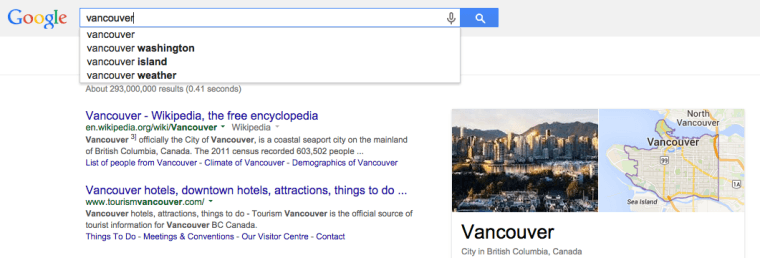 Screenshot 2-3-15
Screenshot 2-3-15Even more puzzling, on the query for “Portland” which is a city in Oregon and Maine, there is a sidebar knowledge graph result for Portland, Oregon with a “see results for” Portland, Maine. This indicates that Google does see two potential entities that match the query and it would be logical to assume that Google might use this to drive knowledge graph in Suggest, too.
 Screenshot 2-3-15
Screenshot 2-3-15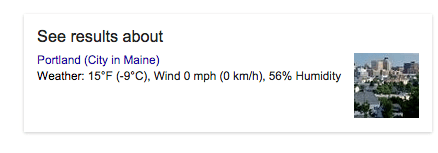 Screenshot 2-3-15
Screenshot 2-3-15In general, the “see results for” callout does not seem to have an impact on whether knowledge graph is shown in search suggest. In the University of Maryland example, there is a “see results about” for the University of Maryland, Baltimore County; however, on the query “El Capitan” there is not. For El Capitan, Google suggests El Capitan as a movie theatre or the summit in Yosemite National Park. However, in the knowledge graph, there is no mention of the movie theater at all.
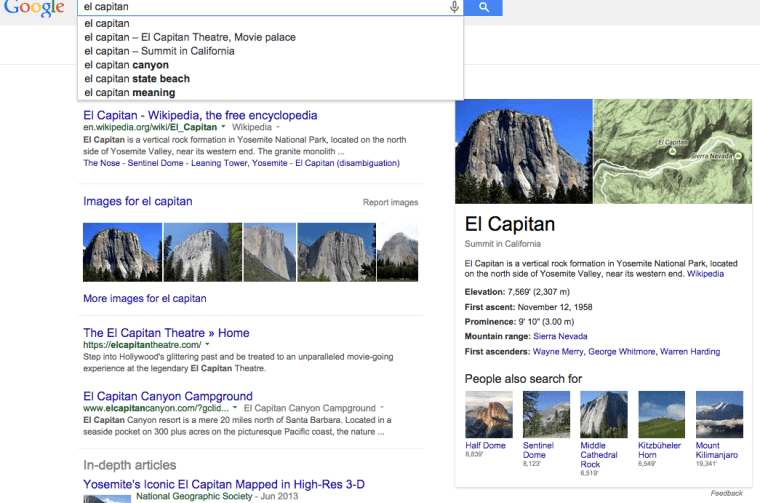 Screenshot 2-3-15
Screenshot 2-3-15Once knowledge graph suggest rolls out on all global queries, this could have a significant impact on how online marketers optimize for keywords. As Google Suggest drives users into modified and longer tail queries, there will be diminished value to ranking on the broadest head terms. For example, a cookbook publisher won’t need to rank high on the generic query for “bread crumb” when Google Suggest will pull in the knowledge graph into search giving the user the option of searching specifically for the food bread crumb.
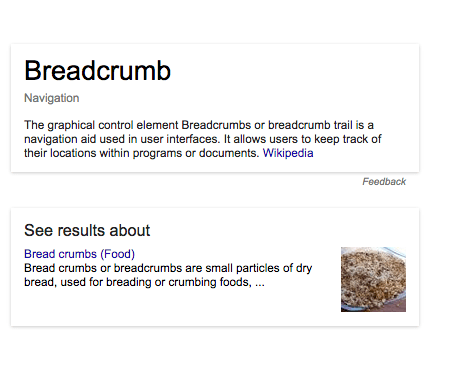 Screenshot 2-3-15
Screenshot 2-3-15While clients and managers may never stop asking their SEO teams to help the rank on the highest volume queries in their category, hopefully, this feature will increase the search query volume on the more specific queries to the point where they also seem quite valuable too.
Bonus
While performing the research on this feature, I bumped into my previous query history impacting Google’s Autocomplete, a feature first blogged about by AJ Kohn. A query for “University of” autocompleted to “University of Miami” based on my previous searches for Miami University.
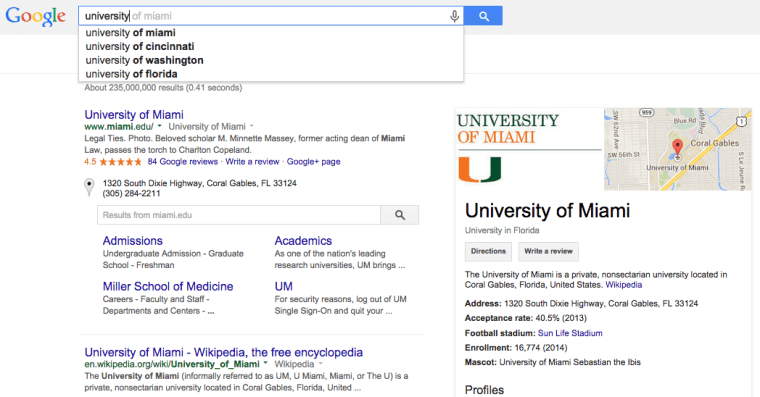 Screenshot 2-3-15
Screenshot 2-3-15Interestingly, there appeared be time component to my previous history affecting autocomplete. Ten minutes after my initial query for Miami University, the autocomplete for University of Miami was gone on the query that started with “University of.” The only interesting note on this query is that all the suggest results were for West Coast universities – where I am currently located – which would seem to imply that Suggest has a default location component.
 Screenshot 2-3-15
Screenshot 2-3-15Most fascinatingly, the location component to Suggest could be changed by a previous query. After a search for the University of Maryland, Google autocomplete suggested University of Maryland after typing in “University of”, but it also suggested the University of Virginia, which is in a similar geographic proximity to Maryland!
 Screenshot 2-3-15
Screenshot 2-3-15Google’s efforts at refining queries while the user is still typing their query means it is more important than ever to create content that matches the precise query/intent that the user is seeking. While this means you need to put more effort into the ideation and creation of content, the benefit is you no longer need to compete for rankings against every website that targets similar keywords. Your content only needs to rank against websites that are targeting the same intent as your site. Lastly, you can use Google Suggest to get great clues as to what real users are looking for. Just start typing and watch what Google suggests!
Featured Image: Screenshot taken February 25, 2015




